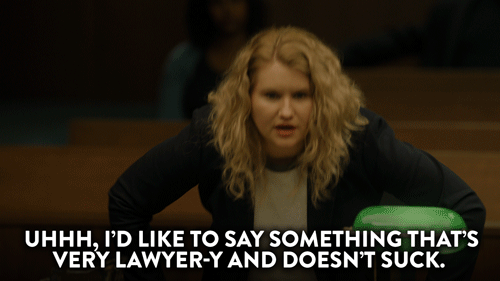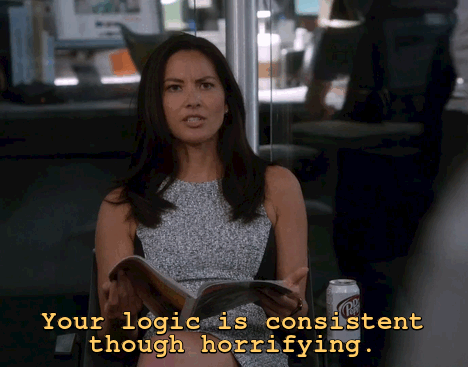It’s a form of swift reasoning, cool logic, effortless problem-solving skills and precision analysis that many non-lawyers wished they possessed in heated exchanges between partners, friends or colleagues. It’s the kind of calculated mental weaponry that shields you from unhelpful, inflammatory emotions while actively disarming your opponent with one slash of your sharp verbal blade.
Sounds enviable, right?
Here’s the good part: the ability to use legal reasoning in everyday life is not a skill confined to the legal profession. Like learning a new language, thinking like a lawyer is a technique that can be developed with time, patience, practice, and a willingness to sometimes sound pretentious.
Time to get brain training.
Step 1: Become a word merchant
Lawyers are inherently competitive. They enjoy peppering everyday conversations with big words and thinly veiled insults.
It’s a strategy used to spice things up with colleagues during casual office banter and to gain an unfair advantage in everyday communications with family members or friends.
How to think like a lawyer
If you want to persuade people with your silver-tongued trial lawyer rhetoric, then you need to brush up on your grammar and vocabulary.
Invest some time thumbing through the thesaurus or dictionary and craft a ready-to-go bank of insults you can draw on in a pinch.
Step 2: Forecast the future and scenario plan
Thinking like a lawyer means preparation, planning and predicting (insofar as possible) the future. This means doing risk assessments before making a big decision, considering all your options, and planning for all possible potentialities.
Like a game of chess, it’s a form of deliberate and methodical thinking that factors in the motivations, agendas and likely next move of your opponent. This habit of thinking before acting is part of the reason why lawyers are often considered to be wholly risk-averse.
The upshot of developing this style of thinking, however, is that you will rarely be surprised by unforeseen negative outcomes of your decisions in personal or professional contexts.
How to think like a lawyer
Before taking a course of action, spend some quiet time considering what could potentially go right and what could possibly wrong as well as what the negative or positive consequences might be.
Try to minimise the number of impulse decisions you make and always have a solid backup plan.
Step 3: Develop analytical and problem-solving skills
Analytical skills are central to the way lawyers solve problems and evaluate issues.
Analytical thinking allows you to visualise, articulate, conceptualise and solve simple and complex problems by making educated decisions and taking calculated risks given available information.
Think like a lawyer
Lawyers are able to pick out salient points from any given problem.
Try not to get bogged down in irrelevant details but focus on the most relevant and critical information. Lawyers analyse the issue and look for the material facts, and evidence that supports those facts. They then look for what conclusions they can draw from known facts, justified with sound reasons.
Step 4: Remain objective
Lawyers are masters at removing emotion from everyday interactions.
Submitting to your feelings leaves you vulnerable, clouds judgement and prevents you from making the best decision in the circumstances.

The ability to tease the emotion out of every situation, including inflamed personal conflicts, is one of the many reasons why lawyers are often described as robotic a-holes.
Think like a lawyer
In any escalating confrontation, stop and take a beat.
Taking your time to respond is a strategy lawyers use to drive their opponents crazy! Use this time to remove yourself emotionally from the immediate drama of the situation. Lawyers don’t allow themselves to be drawn in by cheap insults and other schoolyard tactics, although many will engage in it themselves.
Stay calm and put yourself in your opponent’s shoes. What is the meaning behind their words and actions? This requires a degree of emotional intelligence that, if used correctly, can diffuse any situation.
At the end of the day
Lawyers are just people who have been trained in problem-solving techniques and effective communication.
The ability to think like a lawyer simply means developing your lawyer lips, engaging in verbal sparring in appropriate circumstances, moderating emotion and other subjective influences from everyday scenarios, and always applying critical reasoning, logic and sound judgement.
What lawyerly strategies do you use day-to-day? Let us know in the comments!








 Agree? Get informed about legal change that impacts you with our newsletter. You'll automatically receive fresh content each time we publish.
Agree? Get informed about legal change that impacts you with our newsletter. You'll automatically receive fresh content each time we publish.